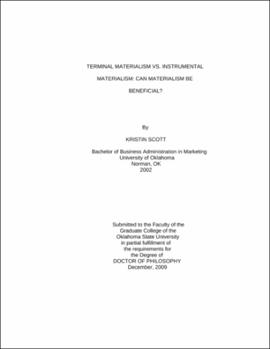| dc.contributor.advisor | Mowen, John C. | |
| dc.contributor.author | Scott, Kristin | |
| dc.date.accessioned | 2013-11-26T08:25:41Z | |
| dc.date.available | 2013-11-26T08:25:41Z | |
| dc.date.issued | 2009-12 | |
| dc.identifier.uri | https://hdl.handle.net/11244/6820 | |
| dc.description.abstract | Scope and Method of Study: Previous research has focused on the negative outcomes of materialism (e.g., Richins and Dawson 1992). This dissertation extends the work of Csikszentmihalyi and Rochberg-Halton (1978) to investigate two types of materialism that are distinguished based upon the purpose of consumption. It is proposed that when good are purchased for status reasons (i.e., terminal materialism) negative outcomes tend to occur. In contrast, when goods are purchased to accomplish tasks (i.e., instrumental materialism) beneficial outcomes result. Three studies were conducted. In the first study, valid and reliable scales were developed to measure instrumental and terminal materialism. The second study employed an on-line survey to investigate the nomological net of the two types of materialism. The third study used an experimental design to assess proposed differences in ad preferences for individuals high and low in instrumental and terminal materialism for practical versus luxury themed advertisements. | |
| dc.description.abstract | Findings and Conclusions: The major contribution of this dissertation is the support for the identification of two types of materialism--instrumental and terminal. In addition, the findings were consistent with the proposal that instrumental materialism is related to beneficial outcomes. This is contradictory to previous arguments that materialism has negative connotations. The results revealed that while terminal materialism was negatively related to self-esteem, instrumental materialism was positively related to self-esteem. Furthermore, terminal materialism was positively related to psychological and technological obsolescence while instrumental materialism was positively related to technological obsolescence but negatively related to psychological obsolescence. These findings suggest that those who are high in terminal materialism have lower self-esteem and are more likely to become dissatisfied with what they already own. Becoming dissatisfied with what you already own could have negative consequences if possessions are replaced at a fast rate, which consumes natural resources and increases landfill waste. In contrast, those high in instrumental materialism have higher self-esteem and are less likely to become dissatisfied with what they already own--outcomes that are argued to be beneficial. | |
| dc.format | application/pdf | |
| dc.language | en_US | |
| dc.rights | Copyright is held by the author who has granted the Oklahoma State University Library the non-exclusive right to share this material in its institutional repository. Contact Digital Library Services at lib-dls@okstate.edu or 405-744-9161 for the permission policy on the use, reproduction or distribution of this material. | |
| dc.title | Terminal materialism vs. instrumental materialism: Can materialism be beneficial? | |
| dc.contributor.committeeMember | Mason, Marlys | |
| dc.contributor.committeeMember | Zablah, Alex | |
| dc.contributor.committeeMember | Kennison, Shelia | |
| osu.filename | Scott_okstate_0664D_10532.pdf | |
| osu.accesstype | Open Access | |
| dc.type.genre | Dissertation | |
| dc.type.material | Text | |
| dc.subject.keywords | advertisements | |
| dc.subject.keywords | materialism | |
| dc.subject.keywords | on-line survey | |
| dc.subject.keywords | planned obsolescence | |
| dc.subject.keywords | scale development | |
| dc.subject.keywords | self-esteem | |
| thesis.degree.discipline | Business Administration | |
| thesis.degree.grantor | Oklahoma State University | |
